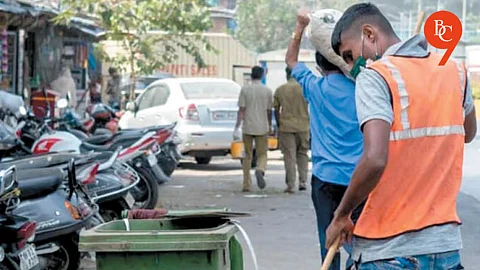

Pune, 13 June 2025: In a bid to ensure thorough cleaning of roads and public spaces, Pune Municipal Corporation (PMC) invested crores of rupees to equip its cleaning staff with GPS tracking wristbands. These bands were designed to monitor where each worker cleaned, for how long, and whether they completed their assigned routes.
However, within months, excuses like battery damage and charging failures turned this modern system into scrap, with the trackers now lying unused, a glaring example of how corruption and negligence undermine public money.
Health inspectors and supervisors allegedly enable this misuse by encouraging workers to mark attendance without doing their jobs. Meanwhile, senior officials remain silent, raising the question: who will fix this rot?
To tackle absenteeism and improve accountability, PMC had initially launched the ‘Integrated Solid Waste Management System’ (ISWMS) as a pilot in the Aundh-Baner-Balewadi area. The results were promising: employee attendance soared to 80 percent, sweeping improved, and supervisors could track each worker’s performance in real-time. Encouraged by these results, then Commissioner Vikram Kumar approved city-wide implementation.
Each cleaning staff member received a GPS-enabled wristband, which provided live updates: where cleaning began, which routes were covered, how long each spot was attended to, and when work concluded. All this information was accessible online, empowering health inspectors to curb negligence instantly.
This transparency forced both workers and health inspectors to do their actual fieldwork. GPS records, being tamper-proof, meant only genuine attendance was paid for, cutting off illegal extra earnings from absentee staff. However, this crackdown hit the vested interests of supervisors and inspectors, who allegedly benefited from fake attendance and bribes.
Consequently, a systematic effort began to sabotage the GPS system: claims of battery failures, charging issues, lost bands even cases where an absent worker would hand over the band to someone else working on their behalf. As collusion spread, an innovative digital tracking solution ended up discarded.
One glaring instance shows the depth of corruption: three workers dismissed from the Dhankawadi-Sahakarnagar region for misconduct were reinstated after paying ₹70,000 each to a health inspector, despite higher-ups being aware but taking no action. The inspector was merely transferred after exposure.
Cleaning staff, supervisors (Mukadams), and private middlemen continue to extort money from hoteliers, shopkeepers, and local businesses, raking in lakhs every month. This parallel bribery system thrives while the official digital system gathers dust.
The ISWMS was not limited to tracking sweepers alone — it was also supposed to track garbage trucks with RFID tags, monitor waste arriving at processing centres, ensure daily toilet cleaning with before-and-after photos, and manage biomedical waste and biogas projects with real-time updates.
Despite spending a massive ₹15.6 crore on this state-of-the-art system to bring transparency and efficiency, poor enforcement and rampant malpractice have rendered it practically useless and once again highlighting how systemic corruption can derail even the best intentions.
